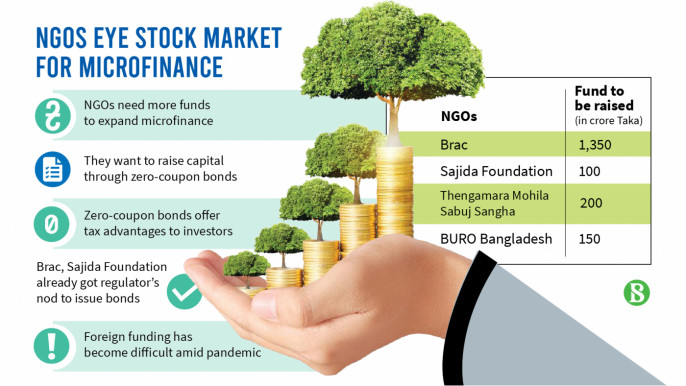With funds becoming scarce both from local and foreign sources, NGOs have found the capital market a preferred destination to raise money amid the pandemic.
They plan to raise capital for their microfinance programmes by issuing zero-coupon bonds taking advantage of tax waivers.
Zero-coupon bonds do not pay interest during the life of the bonds. Investors are interested in these types of bonds because they can buy these at a deep discount from their face values. The investor will receive the face value amount when the bond "matures" or comes due. Coupon-bearing bonds pay interest from time to time.
The income from zero-coupon bonds is tax-free in Bangladesh if the investor is not a financial institution. In contrast, interest income from bank deposits is taxable for all.
Because of the tax incentive, zero-coupon bonds gained popularity among high net worth individuals and institutional investors over the last decade.
NGOs currently have two windows for funding their microfinance programmes – savings of clients and loans from banks or other institutions.
But NGO clients are finding it difficult to pay back loans amid the pandemic. Besides, the Microfinance Regulatory Authority (MRA) has advised the NGOs to suspend loan collection during the pandemic period. Even then, NGOs are encouraging their clients to pay back the loans, in instalments, if possible.
NGOs will get a better interest rate than bank loans if they raise funds from the capital market at this time.
The Palli Karma-Sahayak Foundation (PKSF), a financial institution founded by the government, also provides loans to NGOs but the amount is not enough to meet the current demand.
Brac, the world's largest NGO, has already received the securities regulator's approval to issue a Tk1,350 crore bond to expand its rural and urban businesses.
Sajida Foundation has also got the regulator's nod to issue Bangladesh's first-ever green bond worth Tk100 crore to ensure environmental development.
Thengamara Mohila Sabuj Sangha and Buro Bangladesh recently applied to the Bangladesh Securities and Exchange Commission to issue zero-coupon bonds.
Established in 1964, Thengamara Mohila Sabuj Sangha wants to issue Tk200 crore non-convertible, women empowerment, zero-coupon bonds through private placements. Its total income was Tk783.27 crore in 2019.
Buro Bangladesh, founded in 1990, wants to issue Tk150 crore non-convertible, unsecured, fully redeemable, zero-coupon bonds. Its total income was Tk1,388.21 crore in the fiscal 2019-20.
A few more NGOs are also interested in issuing bonds and investing in microfinance.
Md Aminul Islam, deputy executive director (finance) of Thengamara Mohila Sabuj Sangha, said, "We need more funds to expand the microcredit sector. Compared to other options, the capital market is now the perfect source of funds for NGOs."
It will create a new window for Thengamara Mohila Sabuj Sangha and help get more local and international exposure, he added.
Professor Shibli Rubayat-Ul-Islam, chairman of the securities regulator, said they welcome the initiative to strengthen the country's economy.
To strengthen microfinance, some NGOs recently took the initiative to raise money through bonds, and this is positive for the capital market, he added.
"We are giving these NGOs the opportunity to get involved in the stock market so that they can easily raise funds, which is not going to be easy from other sources amid the pandemic," he added.














